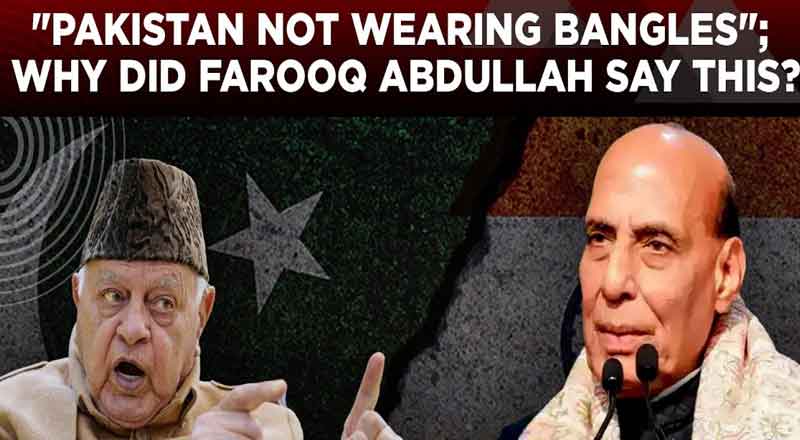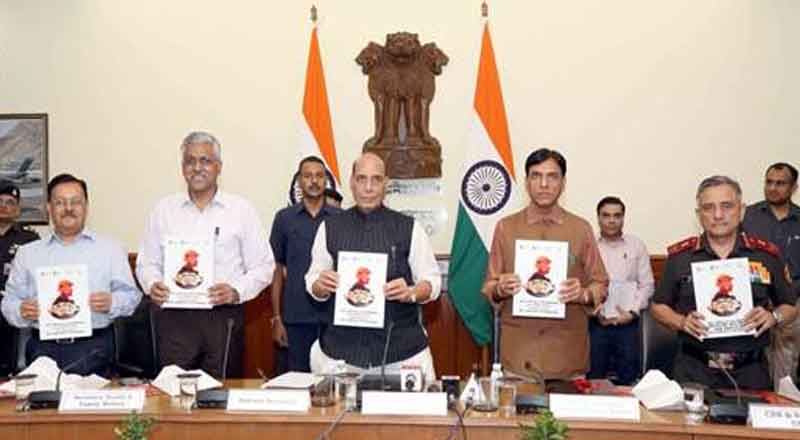- Rajnath Singh said PoK was, is and will remain India’s territory.
- Reacting to the remarks, National Conference leader Farooq Abdullah said Pakistan wasn’t “wearing bangles” and they had atomic bombs.
- Rajnath Singh said the way peace and development had returned in Jammu and Kashmir, there would soon be demands for PoK to merge with India.
- He also asked Pakistan to stop promoting cross-border terrorism.
- Reacting to the attack on security forces in Kashmir, Farooq Abdullah took pot-shots at the ruling BJP, saying terrorism continued despite the withdrawal of Article 370.
In a response laden with geopolitical implications to Union Defence Minister Rajnath Singh’s remarks regarding the potential integration of Pakistan-occupied Kashmir (PoK) with India, Farooq Abdullah, a prominent figure in Jammu and Kashmir’s political landscape, injected a note of caution on Sunday. His commentary, characterized by its sober assessment of the regional security landscape, resonated with concerns over the volatile Indo-Pak relationship, particularly in the context of Pakistan’s possession of nuclear weapons.
Farooq Abdullah’s reaction emerged in the wake of Rajnath Singh’s assertion during a political rally in West Bengal’s Darjeeling. Singh’s assertion centered on India’s burgeoning power, prestige, and economic progress, suggesting that these factors would inevitably lead to demands for the integration of PoK with India. However, Abdullah’s response introduced a sobering perspective, urging against complacency in dealing with Pakistan, a nation armed with nuclear capabilities.
Farooq Abdullah’s remarks underscored the potential ramifications of any escalations in the Indo-Pak conflict, emphasizing the catastrophic consequences of engaging with a nuclear-armed adversary. By highlighting Pakistan’s possession of atom bombs, he sought to caution against underestimating the gravity of the situation and the potential risks inherent in any military confrontation.
While Abdullah’s remarks carried a somber tone, they did not detract from India’s steadfast assertion of its claim over PoK. Rajnath Singh reiterated India’s unwavering stance on PoK, expressing confidence in the eventual integration of the region with India. Additionally, External Affairs Minister S Jaishankar reaffirmed India’s position on PoK, citing a resolution passed by the Indian Parliament affirming its integral status within the country.
Farooq Abdullah’s challenge to the Indian government to reclaim PoK underscored the complex geopolitical dynamics at play in the region. His cautious approach towards engaging with Pakistan reflected a nuanced understanding of the challenges inherent in the Indo-Pak relationship and the imperative of adopting a diplomatic, rather than a confrontational, approach.
Furthermore, Abdullah’s commentary extended beyond the immediate context of the PoK issue, encompassing broader reflections on the political dynamics within Jammu and Kashmir. His prediction of forthcoming assembly polls in the region, coupled with his call for dialogue to address bilateral tensions, underscored a commitment to stability and peace in a region marred by decades of conflict.
Farooq Abdullah’s nuanced response to Rajnath Singh’s remarks encapsulates the complex geopolitical realities shaping Indo-Pak relations. By highlighting the dangers posed by Pakistan’s nuclear arsenal, Abdullah underscores the imperative of adopting a cautious and pragmatic approach in navigating the delicate balance of power between the two nuclear-armed neighbors. In doing so, he reaffirms the importance of dialogue and diplomacy in resolving longstanding disputes and advancing regional stability.
(With inputs from agencies)





